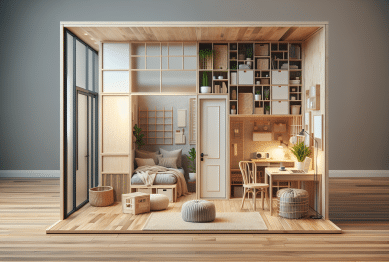In today’s world, where distractions abound—from constant notifications to noisy environments—maintaining focus has become a challenge for many. The ability to concentrate deeply on tasks not only impacts productivity but also influences overall well-being and creativity. Fortunately, simple adjustments in your environment can improve focus significantly, making it easier to navigate the demands of work, study, or personal projects.
This article explores practical, research-backed strategies to optimize your surroundings for better concentration. We will also highlight emerging trends in workspace design and technology that support focused work. Whether you’re working from home, an office, or a co-working space, understanding how your environment shapes your focus can help you achieve more with less stress.

Why Environmental Factors Matter for Focus
Cognitive science and environmental psychology increasingly affirm that our surroundings profoundly impact our attention and mental clarity. The brain’s capacity to filter distractions depends partly on external conditions like lighting, noise, and spatial organization.
According to a 2023 study published in Frontiers in Psychology, cluttered or noisy environments reduce working memory performance and increase cognitive load, making it harder to maintain focus over time.
Moreover, the World Health Organization highlights noise pollution as a global concern affecting concentration, especially in urban settings.
Thus, managing environmental distractions is not just a matter of convenience—it is essential for cognitive efficiency and mental health.
Emerging Trends in Environmental Adjustments for Focus
Several current trends underscore how workplaces and individuals are reshaping environments for improved concentration:
- Biophilic Design: Incorporating natural elements like plants, sunlight, and natural materials enhances mental restoration and attention.
- Quiet Zones and Focus Rooms: Many companies now offer designated quiet spaces or phone booths to minimize interruptions.
- Personalized Workspaces: Adjustable lighting, ergonomic furniture, and noise-cancelling tools tailored to individual preferences are gaining traction.
- Digital Minimalism: Reducing digital clutter and limiting app notifications helps maintain digital focus.
These trends are practical responses to the growing demand for environments that support sustained attention.
Practical Adjustments in Your Environment to Improve Focus
Below are actionable changes you can implement right now to enhance your concentration.
1. Declutter Your Workspace
A clean, organized workspace reduces cognitive distractions.
- Remove unnecessary items from your desk.
- Use storage solutions to keep essentials within reach but out of sight.
- Maintain digital organization by managing desktop icons and email inboxes.
Research indicates that decluttering can reduce stress hormones and improve task performance.
2. Optimize Lighting
Lighting impacts alertness and mood.
- Aim for natural light exposure; position desks near windows if possible.
- Use adjustable lamps with soft white light to reduce eye strain.
- Avoid harsh fluorescent lighting or overly dim environments.
A study by the Lighting Research Center found that proper lighting improves concentration and reduces fatigue.
3. Control Noise Levels
Sound can either aid or hinder focus.
- Use noise-cancelling headphones or white noise machines.
- Consider ambient sounds like nature sounds or soft instrumental music.
- If possible, create a quiet room or designate “focus hours” at home or office.
Noise pollution studies show that consistent exposure to distracting sounds reduces productivity by up to 66% .
4. Introduce Natural Elements
Biophilic design elements support cognitive function.
- Place plants on or near your desk.
- Use natural textures and colors in décor.
- Take breaks outdoors to reset mental energy.
The Human Spaces Report (2023) states workers with access to natural elements report a 15% higher level of focus.
5. Manage Temperature and Air Quality
Comfort influences focus more than many realize.
- Keep your workspace at a moderate temperature (around 21–23°C or 70–73°F).
- Use air purifiers or ensure good ventilation to maintain air quality.
- Hydrate regularly.
Studies link poor air quality to reduced cognitive performance, highlighting the importance of fresh air.
6. Use Ergonomic Furniture
Physical discomfort distracts mental focus.
- Choose chairs with lumbar support.
- Maintain proper screen height and posture.
- Incorporate standing desks if feasible.
Ergonomic improvements have been shown to decrease musculoskeletal issues and increase work engagement.
7. Limit Digital Interruptions
Digital distractions are among the biggest focus disruptors.
- Turn off non-essential notifications.
- Use website blockers or focus apps during work sessions.
- Keep phones out of sight or on “Do Not Disturb” mode.
Research from the University of California Irvine highlights that task-switching caused by notifications can cost up to 23 minutes of productivity per interruption.
Creating a Personalized Focus Environment: A Summary Checklist
- Declutter your physical and digital workspace.
- Maximize natural light and use adjustable lighting.
- Control noise with headphones or soundscapes.
- Incorporate plants and natural materials.
- Maintain comfortable temperature and fresh air.
- Use ergonomic furniture to support posture.
- Limit digital notifications and distractions.
Implementing these adjustments incrementally can create a cumulative positive effect on your ability to focus.
Conclusion
Simple adjustments in your environment can improve focus more than many realize. As work and life demands increase, optimizing your surroundings is a practical, science-backed approach to enhance mental clarity and productivity. By embracing emerging trends and applying these proven strategies, you can cultivate a workspace that supports your best performance and well-being.
References
- Frontiers in Psychology. (2023). Environmental Distractions and Working Memory Performance.
https://www.frontiersin.org/articles/10.3389/fpsyg.2023.1032470/full - World Health Organization. (2022). Noise Pollution and Its Impact on Health.
https://www.who.int/publications/i/item/9789240041367 - Human Spaces Report. (2023). The Impact of Biophilic Design on Workplace Well-being.
https://humanspaces.com/human-spaces-report-2023/









